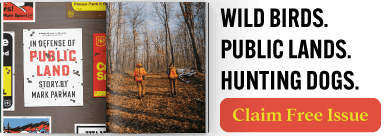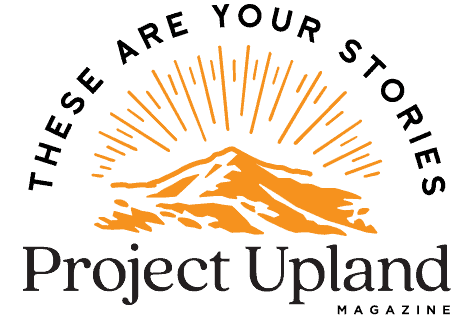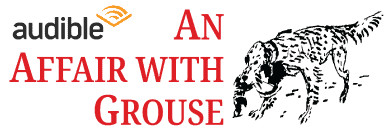Home » Conservation » What We Can do for the Ruffed Grouse Society
What We Can do for the Ruffed Grouse Society

A.J. DeRosa, founder of Project Upland, is a New England…
An Open Appeal from the recent Ruffed Grouse Society #HealthyForests film featuring Project Upland Creative Director A.J. DeRosa
Somewhere along the road of fighting to help the future of the ruffed grouse, or more accurately forest health, the message of habitat became increasingly ineffective. Maybe it never was effective. We all know science says we need grouse habitat to save the future of the ruffed grouse but at the end of the day that solution means nothing to the masses. It makes the echo chamber of us all saying “it comes down to habitat” null and void.
I submit to you that the crisis of the ruffed grouse and its future is not an issue of habitat, it is an issue of messaging, and relevance. The sooner we accept that reality and stop the insanity of saying the same thing over and over again and expecting different results the better.
Humans are curious creatures. We want to know for ourselves why something is true (or not). Simply saying the solution is “habitat” in a world of partisanship is like throwing a grain of salt in the ocean. We need mechanisms for stories that helps us find our way to the truth and perhaps more importantly, a reason to need that truth.
The first and foremost reason for this post and film is to call attention to the efforts of the Ruffed Grouse Society and American Woodcock Society. In the past year the organization under the new leadership of Dr. Ben Jones has made leaps and bounds in not only truly advancing the mission of forest health but in building bridges with groups and organizations we have previously found ourselves at odds with. At this moment we are finally moving forward and because of that more than ever we all need to step up and help this organization harness the power of this community.
Not to sound like JFK but here it goes anyways. The idea of what non-profits “can do for me” needs to change to what “we can do for them.” The real conversation, the one of a true conservationist is “what can we do as members for the Ruffed Grouse Society”. I believe that question will ultimately lead us to progress and success in this fight.
If you are not a member, if you do not even live in ruffed grouse country, do not even hunt birds, I appeal to you that we NEED your help. This snippet was taken from the opening letter I wrote for our Spring 2020 Issue of Project Upland Magazine as part of the #PublicGrouse theme from our recent film tour.
“Our hope is that people take from this issue the specialties of these birds as well as the sobering reality of how dark their future is. Decline is the most common trend. The places I hunted ruffed grouse 25 years ago have no grouse at all. They’ve disappeared over just a fraction of my lifetime, not a whole lifetime. The lack of forest health in our single-aged national forests has left them void of biodiversity. And dare I mention climate change, which is affecting all of them in one way or another. And ruffed grouse aren’t the only grouse species that are (forgive the language—I lack a better term) f%$#ed.”
“The sage grouse story is a political circus and is among one of the most imminent impeding environmental crises. Prairie chicken nesting is at the mercy of changing weather patterns and the population has been extirpated from many of its native ranges. Sooty grouse populations have decreased about 2 percent per year since 1966…”
“… Let the film #PublicGrouse and this issue of the magazine stand as a testimony. Fifty years from now, many of us will still be here to answer for what we do today. Our children and our children’s children will ask one simple question if we fail: ‘Why did you let it die? You said you loved the bird, the environment, the land, and the lifestyle.’ And here we stand under the judgment of future generations. Their conclusions, not our excuses, will be the only thing that matters. Let us not be the generation that allowed this to fail on our watch. Rather, let us be remembered as the generation that drew a line in the sand, faced reality with unwavering conviction, and reversed the great decline of the North American grouse for a sustainable future.”
I am sure many may read or watch a film like this and shake their heads about words like “climate change” or maybe the bold statement that “just buying a hunting license does not make you a conservationist“. Climate change is not just one of the strongest story lines in the 21st century but a legitimized policy driving fact. Denying climate change is a great way to NOT be part of the conversation going forward. It is a great way to NOT get a chance to sit down with organizations moving environmental policy. And all for what? Seriously, think long and hard about that one, what does that gamble achieve? Because quite literally if there is a sliver of possibility that you are wrong (which boy would I love to be wrong), then we as a species, environment, and planet will never be able to pay that debt. Wherever you stand on this often times polarizing issues, this is about being a part of the conversation.
I get it, a rant on how “climate change” is man-made or not, does not change the end result. But as a species that has put ourselves on the moon, harnessed nuclear energy, and much more, rolling over and calling it quits feels like the opposite of human nature. The health of our forests and wildlife must be included in any conversation that effects our future. And who better to be our voice in that conversation than the Ruffed Grouse Society?
And as I am sure some may still be caught up on my statement about hunting licenses and conservationists, I will submit to you part of a recent article in the Hunt Rising publication by Northwoods Collective.
“A conservationist is a person who advocates or acts for the protection and preservation of the environment and wildlife. Now, I am not trying to poke too hard here, but how does buying a hunting license (which is required by law) and paying excise taxes on gear translate to that person ‘advocating or acting?’ My town requires us to recycle by law, does that make me an environmentalist? I would submit that being a conservationist is much more than simply buying a hunting license and paying excise tax. And many hunters have no business weaponizing a word that they have no business claiming for themselves.”
“If a hunter desires to be a conservationist, he or she would have to actually act or advocate. Maybe join a non-profit, volunteer time, raise awareness on environmental issues that affect wildlife. Ranting about big bucks and the need for more deer when we live in a world plagued by overpopulation leading to CWD, invasive plant species expansion, and destruction of diverse habitat sounds like quite the opposite of conservation.“
We all have an obligation to the ruffed grouse and to our forests. As ruffed grouse hunters, no matter how you hunt them, we owe it the resource. As a millennial, I appeal to people in my age group and younger to rally for this fight. And to all those that came before us, the people that mentored us, the people that sparked our passion, the people that paid it forward, we THANK YOU for what you have done and continue to do. Right now we need you more than ever to stand behind us, support us, and help us push this forward.
A.J. DeRosa, founder of Project Upland, is a New England native with over 35 years of hunting experience across three continents. His passion for upland birds and side-by-side shotguns has taken him around the world, uncovering the stories of people and places connected to the uplands. First published in 2004, he wrote The Urban Deer Complex in 2014 and soon discovered a love for filmmaking, which led to the award-winning Project Upland film series. A.J.'s dedication to wildlife drives his advocacy for conservation policy and habitat funding at both federal and state levels. He serves as Vice Chair of the New Hampshire Fish & Game Commission, giving back to his community. You can often find A.J. and his Wirehaired Pointing Griffon, Grim, hunting in the mountains of New England—or wherever the birds lead them.




Great article. Our James River Chapter RGS has come alive the last couple of years, we have passed the RGS message through our banquets, sporting clay shoots, women’s shooting events, inviting new shooters and bird hunters to come hunt with experienced members and experience a bird hunt. All these activities has greatly increased the number of folks we have haved shared the RGS message. We are seeing that folks are beginning to understand the need to do something and are starting to do something. Our Chapter will be doing a day of habitat work at Cumberland State Forest on February 29th and our neighboring Chapter in Staunton, Virginia has a habitat work day scheduled in March. So, as they say, it begins st home.
Again, thanks for the great article and all you work.
Mr. DeRosa, you have written a great message and its a joy to watch a working Griff! It’s about time someone in the hunting forum has spoken these words, bravo to Project Upland. I could not agree with you more. There should be no beating around the bush here, we will lose our opportunity to hunt ruffed grouse and all migratory birds if we don’t face climate change head on. We are currently amidst a mass extinction and it’s not just the birds we hunt.
The very most important thing we must do, is to elect politicians who stands with us on environmental advocacy. It’s a lost battle for RGS members to volunteer at their local chapter for a habitat effort, to then vote for a politician who deregulates environmental protection.
Our aim should be to collaborate with legislation in Washington, in order to enhance large scale RGS and DU projects.
I am an avid supporter of Ruffed Grouse Society, Ducks Unlimited, and Pheasants Forever but our membership dollars and hunting license fees won’t save critical habitat without advocates in Washington. We owe it to ourselves and to our four-legged friends to preserve the wild spaces of our great country.
A.J, you are a spokesman for this community, you have an art for gathering peoples, you now have inherited an opportunity of leadership. Watching this video and reading your most recent thoughts, I am truly moved and strongly believe you have what we need. Let us not miss the bigger picture. Let us not forget the joy of watching the sun come up over a ridge, a well-trained dog by our side, a long day of hunting ahead, surrounded by the beauty of protected public land. “THIS is our story,” our unfortunate reality.
I thank you greatly for mentioning climate change and turning a page in our conversations. I stand with you and your ideals. Let’s keep it going further.
Fact of the matter is, you have accomplished nothing. That is, if your purpose is to increase the population of grouse. As you continue to place blame-you continue to miss the target? Where is the science? You seem to have no idea after years of research and millions? of dollars what needs done to increase grouse populations! Just saying.
Hey David,
I believe you have missed the point of the article completely ( as surely as you probably miss plenty of easy shots on game birds)….
Mr. DeRossa is well aware of the science behind ruffed grouse management !